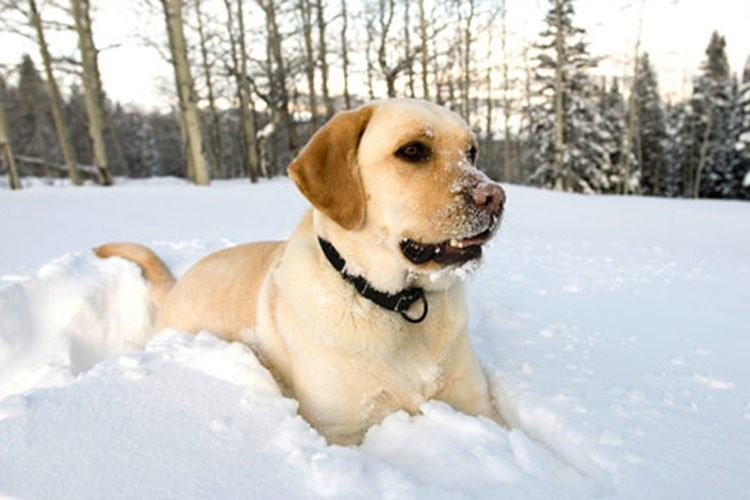Follow these tips to keep your pets safe during the cold winter months
You’re probably already aware of the risks posed by warm weather and leaving pets in hot cars, but did you know that cold weather also poses serious threats to your pets’ health? Follow these tips from the AVMA to keep your pets safe during cold weather:
Winter Wellness
Has your pet had his/her preventive care exam (wellness exam) yet? Cold weather may worsen some medical conditions such as arthritis.
Know the limits
Pets’ cold tolerance can vary from pet to pet based on their coat, body fat stores, activity level, and health. Be aware of your pet’s tolerance for cold weather, and adjust accordingly.
Provide choices
Pets prefer comfortable sleeping places and may change their location based on their need for more or less warmth. Give them some safe options to allow them to vary their sleeping place to adjust to their needs.
Stay inside
Cats and dogs should be kept inside during cold weather. It’s a common belief that dogs and cats are more resistant than people to cold weather because of their fur, but it’s untrue. Like people, they are susceptible to frostbite and hypothermia and should be kept inside.
Check the paws
Check your dog’s paws frequently for signs of cold-weather injury or damage, such as cracked paw pads or bleeding. During a walk, a sudden lameness may be due to an injury or may be due to ice accumulation between his/her toes.
Play dress-up
If your dog has a short coat or seems bothered by the cold weather, consider a sweater or dog coat. Have several on hand, so you can use a dry sweater or coat each time your dog goes outside.
Wipe down
During walks, your dog’s feet, legs and belly may pick up deicers, antifreeze, road salt or other chemicals that could be toxic. When you get back inside, wipe down (or wash) your pet’s feet, legs and belly to remove these chemicals and reduce the risk that your dog will be poisoned after (s)he licks them off of his/her feet or fur. Consider using pet-safe deicers on your property to protect your pets and the others in your neighborhood.
Collar and chip
Many pets become lost in winter because snow and ice can hide recognizable scents that might normally help your pet find his/her way back home. Make sure your pet has a well-fitting collar with up-to-date identification and contact information. A microchip is a more permanent means of identification, but it’s critical that you keep the registration up to date.
Stay home
Hot cars are a known threat to pets, but cold cars also pose significant risk to your pet’s health. You’re already familiar with how a car can rapidly cool down in cold weather; it becomes like a refrigerator, and can rapidly chill your pet.
Prevent poisoning
Clean up any antifreeze spills quickly, as even small amounts of antifreeze can be deadly. Make sure your pets don’t have access to medication bottles, household chemicals, potentially toxic foods such as onions, xylitol (a sugar substitute) and chocolate.
Protect family
Odds are your pet will be spending more time inside during the winter, so it’s a good time to make sure your house is properly pet-proofed. Use space heaters with caution around pets, because they can burn or they can be knocked over, potentially starting a fire.
Avoid ice
When walking your dog, stay away from frozen ponds, lakes and other water. You don’t know if the ice will support your dog’s weight, and if your dog breaks through the ice it could be deadly.
Provide shelter
We don’t recommend keeping any pet outside for long periods of time, but if you are unable to keep your dog inside during cold weather, provide him/her with a warm, solid shelter against wind. Make sure that they have unlimited access to fresh, non-frozen water. The floor of the shelter should be off of the ground and the bedding should be thick, dry and changed regularly to provide a warm, dry environment
Recognize problems
If your pet is whining, shivering, seems anxious, slows down or stops moving, seems weak, or starts looking for warm places to burrow, get them back inside quickly because they are showing signs of hypothermia. Frostbite is harder to detect, and may not be fully recognized until a few days after the damage is done. If you suspect your pet has hypothermia or frostbite, call your closest veterinary emergency hospital immediately.
Feed well
Keep your pet at a healthy weight throughout the winter. Some pet owners feel that a little extra weight gives their pet some extra protection from cold, but the health risks associated with that extra weight don’t make it worth doing. Watch your pet’s body condition and keep them in the healthy range.
We hope these tips have been helpful. Contact us if you have any questions.

